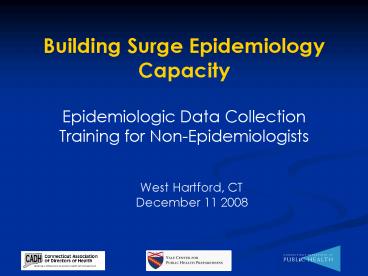Building Surge Epidemiology Capacity - PowerPoint PPT Presentation
1 / 19
Title:
Building Surge Epidemiology Capacity
Description:
... Capacity. Epidemiologic Data Collection Training for Non-Epidemiologists ... To assist epidemiologists by collecting epidemiologic data during a wide scale ... – PowerPoint PPT presentation
Number of Views:49
Avg rating:3.0/5.0
Title: Building Surge Epidemiology Capacity
1
Building Surge Epidemiology Capacity
- Epidemiologic Data Collection Training for
Non-Epidemiologists
West Hartford, CT December 11 2008
2
Introduction for Epidemiology Support Personnel
3
Training Developers
- Yale Center for Public Health Preparedness
- Supported by CDC Cooperative Agreement
U90/CCU124251 - Connecticut Association of Directors of Health
- Connecticut Department of Public Health
4
Emergency
- A serious, unexpected, and potentially dangerous
situation requiring immediate action. - W.H.O
5
Disaster
A disaster is any occurrence that causes damage,
ecological disruption, loss of human life or
deterioration of health and health services on a
scale sufficient to warrant an extraordinary
response from outside the affected community
areas. W.H.O
6
Common Features of Large Scale Disasters/Emergenci
es
- Pose a threat to public health safety
- May disrupt social and economic infrastructure
- May require large scale mobilization of resources
to manage consequences.
7
Types of Emergencies and Disasters
- Floods
- Large explosion
- Infectious disease epidemic
- Naturally occurring
- Bioterrorism
8
Epidemic
- The occurrence of a disease in a community or
region that has a frequency clearly in excess of
normal expectancy - epidemic Outbreak
9
Crucial Role of Epidemiology in Disasters
Response
- To collect, analyze and disseminate
health-related data on the affected community so
that decision-makers can use the information to
guide a rational response
10
Epidemiology Support Personnel
11
Who Are Epidemiology Support Staff
- Local public health workers including
- Nurses / Health Aides
- Health educators
- Sanitarians / Environmental health staff
- Other local health personnel
12
Role of Epidemiology Support Staff
- To assist epidemiologists by collecting
epidemiologic data during a wide scale epidemic
or other public health disaster - Interviews
- Medical chart reviews
13
Support for your role
- You will never be working alone!
- You will be working as a part of a team
- You will always be assigned a supervisor to whom
you can take your questions/concerns
14
Confidentiality
- Confidentiality of information must be maintained
- You will be asked to sign a confidentiality
agreement
15
Training overview
16
Overall Aim
- To introduce epidemiology support staff to the
concepts and skills they will need to perform
their role during a disaster response
- Additional specific training will be provided at
the time of response!!
17
Learning objectives
- By the end of the training you should be able to
- Describe the role of epidemiology support
personnel - List the ways that infections may be spread from
person-to-person - Define the term case definition and describe its
importance for good quality epidemiologic data
collection - Describe interviewing techniques used to collect
good quality epidemiology interview data - List challenges interviewers face and describe
methods for dealing with them - Locate standard information in a medical chart
- Describe the purpose of and steps in a contact
investigation interview
18
Schedule
19
Sources of training material
- Original material and material adapted from
- Florida Center for Public Health Preparedness
- Field Investigation Response and Surveillance
Training - Intermediate Field Investigation Response and
Surveillance Training - North Carolina Center for Public Health
Preparedness - Medical Terminology and Abbreviations
- New York State Department of Public Health
- Field Epidemiology Surge Team Training































